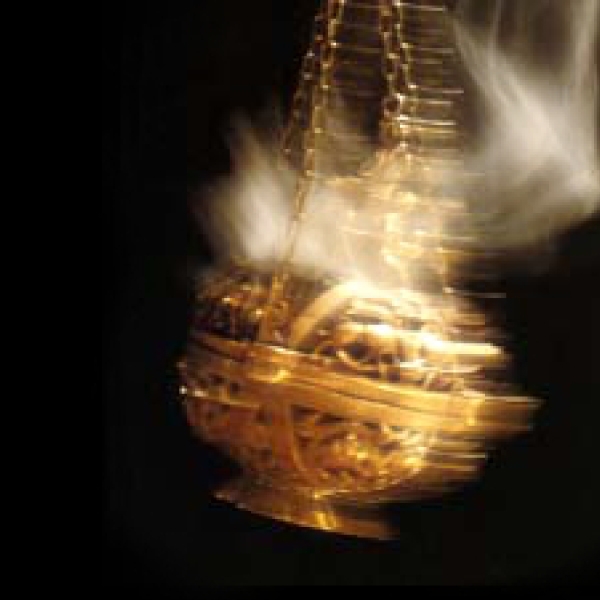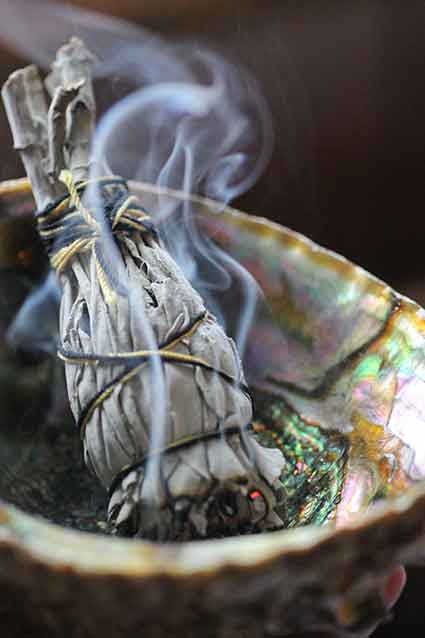

Thurible
For my prayers will be born upon the rising incense smoke
The Thurible itself is associated with the element of Air, and the incense that is burnt within it is associated with the fire element. Thurible fire blends are a way of releasing the aroma of incense, the energizing properties of Fire and Air, and the grounding and cleansing powers of the mineral salts. These traditional Majikal methods come together in natural and effective technique that purifies and charges any area with Fire and fragrance. Negative energies are drawn into the salts, and the Air and Fire release the majikal scent cleanly.
Thurible blends can also be burned upon a charcoal block as you would regular incense – they are stronger and more resinous than regular incense, so please use less, especially when working indoors as this can cause coughing, especially with too mush smoke. This method of releasing fragrance is to be used with caution and never to be performed unattended, use are and common sense whenever dealing with an open flame, especially with charcoal blocks as they become dangerously hot. Do not use in windy areas or near flammable substance – as with everything in the craft use with caution and respect.
The use of incense in religious rites is inextricably linked with sacrifice, as in early times when man made sacrifices to the ‘Old Gods’, humans or animals were ritually slain and immolated, the fire being the mediator between the people and divinity, the rising smoke carrying the offerings and the prayers up to the Gods. It is not possible to decide why sweet smelling substances were originally added to the flames. It may have been purely pragmatic – an air freshener – or it may have had magical – religious associations.
If life and death were both attributed to – or at least influenced by spirits of a corresponding goo or bad disposition, the liberation of perfume of a sweet nature would allow its inherent Spirit to manifest and overpower (defeat) the evil entity which was present. The more pure and rare the substance employed, the greater the power of action.
Olibanum (true Frankincense) from the Boswellia Tree was the choice par excellence, although Sandalwood (Santalum album) was more commonly used, but is now, because of world shortage quite a rarity. Other incenses that are used during sacrificial rites include the Conifer referred to by the Greeks as Thuja. Gum Mastic, Cedar, Storax and Dragons Blood.
The second area of incense usage that we need to consider may prove more worthwhile in our endeavor to marry the Thurible with Fire. In ancient Greece, at Delphi, the Phoebades – Oracular Priestesses of the Phythian Priesthood – was seated upon a tripod which stood across a chasm within the Cave of Apollo (who appeared in the shape of a python). Legend has it that shepherds noticed goats near the cave were seized by strange fits which caused them to dance and emit strange cries.
Later one of the shepherds, curious to know the cause of this behavior, approached the cavern and was overcome by fumes. He danced jabbered and foretold future events. What were these fumes? Were they merely volcanic vapors whose sulphurous content caused difficulty in breathing to the sensitiveness – with the resulting anoxia giving rise to and altered state of consciousness wherein clairvoyance was enhanced? Or were they, as story told, which was circulating shortly after establishment of the Priesthood, the odors of the decaying body of the python – the manifested boy of the ‘Dying God’.
Several authors who have studied classical literature and practices have suggested that the fumes are those arising from the burning of Laurel leaves, whose poisonous sap would be found in the rising smoke and which when inhaled would cause a delirium in the breather. Bearing in mind there are several cultures where similar practices are employed; ie, the inhalation of incense smoke in large quantities prior to ‘ministering the word of God or Goddess’ – and including the use by Witches, of Khat (Catha edulis) and Mugwort – this would not seem improbable.
We would then be able to show the connection between incense and fire, not merely from the rising of ‘the prayers of the people upon the Holy Smoke’ as gave sacrifice to the Sky Gods, but also from a practice of burning hallucinogens upon a burner of sorts (later developing into the Thurible) to achieve a mental change, a change from the physical to the spiritual. The convention of a Thurible standing upon three legs appears to be a continued tradition of the tripodic throne of the Phoebades.
Over the centuries substances have been used as incense for a variety of purposes. Asafetida (Devils Dung) for evil rites and banishing, and Wormwood for Necromancy; to Musk for seduction; and Myrrh for embalming and funerary rites. In general, the extracted oils or gums were used instead of actual plant or wood, the more common of these herbs or oils being:
Acacia – religious herb used for consecration and invoking the Egyptian God Osiris.
Aconite – herb of immortality and protection and invoking the Hecate and Medea.
Agrimony – counter majik and a herb of protection.
Alder – sacred tree of the Goddess should never be cut down. Fertility herb, funereal herb, also a visionary herb. Used for invoking Calypso, Embla and Minerva.
Alfalfa – Herb of protection when burnt and the ashes places in a talisman.
Almond – herb of consecration and immortality. Used for invoking Artemis, Attis, Cybele, Hecate and Zeus.
Aloe – Funereal herb and for invoking Venus.
Angelica – herb of purification and a counter majik herb used for invoking Atlantis and the Archangel Michael.
Anise Seed – greene & fertility herb for love. Used for invoking Apollo, Hermes and Mercury.
Apple – herb of majik, fertility, power and immortality, used for invoking Abellia, Aphrodite, Diana, Ga., Here, Idun. Odin. Venus and Isis.
Asafetida – Herb of banishing, consecration and protection used to invoke Pan, Cernunnos and Priapus.
Ash – Visionary and religions herb used for invoking Gwydion, Odin and Poseidon.
Balm – herb of love and majik used for invoking Diana.
Basil – herb of cleansing, consecration and visionary. Used for invoking Krishna and Vishnu.
Bay Laurel – visionary and majikal herb used for invoking Apollo, Daphne and fides.
Benzoin – Religious herb for invoking Aphrodite, Mut and Venus.
Betony (wood) – herb of majik and protection used for invoking the powers of Jupiter.
Birch – fertility and religious herb used of invoking Thor.
Blessed Thistle – Aphrodisiac herb used for invoking Pan.
Catnip – fertility and visionary herb used for invoking Bast and Seknet.
Cedar – used in wiccaning’s and baby blessings as a herb of consecration.
Chrysanthemum – immortality herb used in honor of those departed.
Cinnamon – used in temples to raise the energies and in love rituals.
Cinquefoil – to heighten romance and to promote an abundant harvest.
Clary Sage – offering to the Moon, for cleansing and healing and meditation.
Clover – the herb of promises, good to make an oath in ritual or Initiation.
Cloves – sacred tree respected as like pregnant women and good for social gatherings.
Coltsfoot – mainly used for cleansing the lungs and for love.
Comfrey – protection with travel and in majikal healing
Coriander – to enhance the power of healing and to bring peace and harmony
Corn – used as an offering to all deity for new beginnings, harvest and fertility.
Daffodil – helps to increase love towards oneself, also to banish evil from your home.
Daises – these grown in the garden attracts the Devas, the elementals and Faerie Realm.
Damiana – a majikal aphrodisiac and used in the Great Rite when made into wine.
Dandelion – the herb of Hacete. Helps to tune into the underworld around the time of Samhain, to contact ancestors.
Dill – great protection against black majik.
Dittany of Crete – associated with Samhain and the underworld in seeking contact with departed spirits, especially in connection with Persephone, Osiris and Isis.
Dragons Blood – used in embalming by the Egyptians, also for protecting witches and for writing oaths and spells on parchment.
Elder – protection against all evil and dark majik. Ritually the healing tree, for making ritual Elder Wine.
Elm – believed to be the tree of Adam and Eve, ancient coffins used to be made from this wood. The Tree of Life.
Ephedra – considered to ‘Original Source of Life’, great herb when studying nature and the Elements.
Eyebright – it helps us to work with changing ourselves internally, to make more positivity.
Fennel – helps in strengthening inner sight to increase the length of ones incarnation.
Fenugreek – to attract money and prosperity
Fern (Bracken) – herb of the Gods, power with the unseen world.
Fir – sacred tree of Artemis. A Fir branch with a phallic tip is great for a wand.
Flax – great for physical and spiritual cleansing and for ritual bath, fertility rites. Also placed in tombs.
Foxglove – assists in contacting the Faerie people, should only be collected under the full moon. Brings true majik to your garden.
Gourd – associated with the moon and can be used as a rattle when dries or cut and used as a Chalice.
Grapes – for making the sacrificial wine as an offering to Bacchus, Dionysus, and Priapus.
Gum Mastic – majikal incense used to cleanse and bless all diviantory tools, and for protection.
Hawthorn – sacred to the Goddess Cardea this herb helps to protect all infants.
Heartsease – great as a Love Charm, to bring romance into ones life.
Heather – used in Initiation rituals especially in Scotland.
Hemlock – used to consecrate a Ceremonial Dagger. Very poisonous and used as a poison.
Hemp – great in strengthening belief in Deity.
Henbane – to aid in astral Travel. But very dangerous.
Henna – used to adorn the body and add sensuality, rubbed on the phallus with olive oil increases virility.
Holly – dedicated to the Holly King
Hollyhock – used to increase the flow of money and to increase success in the material world.
Honeysuckle – used to enhance ones inner sight, and as a beautiful scented oil.
Hyacinth – associated with the Tarot card Justice; it is a patron herb for gay men.
Hyssop – used for cleansing sacred spaces, also as a aspurger in rituals, excellent for cleansing and purification.
Iris – strengthens faith and wisdom. When used in rituals of death and dying, helps bring peace to the beloved.
Ivy – protects witches when around the home, also used as a wreath in honor to Bacchus.
Jasmine – jasmine is associated with the feminine and used in material rituals. It is also the sacred herb of Diana.
Juniper – used to cleanse and purify homes and to attract good and positive energies.
Kava Kava – used in ancient ritual of the Great Rite and as a sacramental drink.
Ladies Mantle – increases the power of the Great Rite and as a sacramental drink.
Laurel – used in funerary rituals to free the spirit from the body.
Lavender – burned in birthing rooms, and at hand-fasting rituals. It promotes love.
Lemon – used for any sexual workings.
Lilac – encourages the Devas to take up residence where they are grown.
Lily – symbol of purity and tears.
Lotus – represents religious symbolism in total and joiner of the elements. Helps with incarnation.
Lovage – worn by all single ladies to attract their perfect mates.
Mandrake – Mandrake holds more power than many can ever comprehend. It is the most sacred of all majikal herbs.
Marigold – can cleanse negative energy, and also used in live divination.
Marjoram – used in spiced mead drinks cooked in bale fire, with added honey.
Meadowsweet – sacred to all Virgin Goddesses, lucky for brides to wear on their wedding day. Worn to attract your soul mate.
Mistletoe – can help in protecting you against fire. The berries are sympathetic to male testicles, and therefore good for fertility.
Moneywort – used for attracting money and prosperity.
Motherwort – boosts one’s ego and builds ones self confidence.
Mugwort – helps with visions and lucid dreams, mugwort is the herb of the moon.
Mullein – used in incantations and to drive away evil spirits.
Myrrh – sacred to Aphrodite and burned as an offering incense, also for personal sorrows and injuries.
Myrtle – associated with intimate women’s mysteries. Also associated with domestic violence.
Narcissus – Beware this is a narcotic, only use the flowers and not the bulb. This herb is associated with the underworld.
Nettles – majikal healing power. Also makes majikal dye for writing.
Deadly Nightshade – used for sleep, but deadly to humans and can be fatal.
These many herbs the we use for specific purposes. All of these herbs mentioned can be used as an incense in your majikal workings, but please be careful with some of them, as they can be considerably dangerous.
